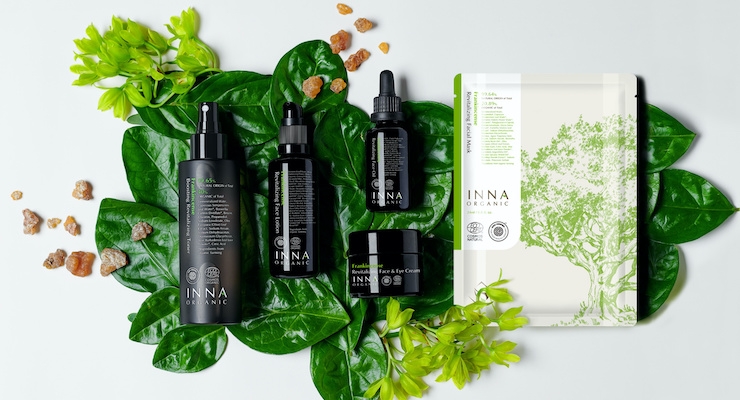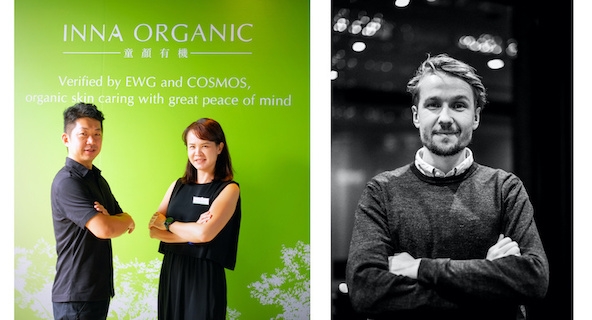Bobbie van der List, Asia-Pacific Correspondent04.23.20
Taiwan is not necessarily the first place you think of when it comes to the cosmetics industry, but that’s about to change with more Taiwan-based brands going overseas. For one, Taiwan is known as the largest facial mask producer in the world, and Inna Organic leads the way as the country’s No. 1 brand.
While Europe and the United States perform well in terms of environmental sustainability in a lot of different beauty product segments, their market share in facial masks is modest. Inna Organic is happy to fill this void and aims to become the leader in global organic sheet masks.
Inna Organic is the only brand in Taiwan certified by both EWG as well as COSMOS, which puts the Taipei-based company in an ideal position to understand the differences between the U.S. market and the Asian market. Inna Organic is very popular in Asia—it’s a household brand in Hong Kong, Macau, Singapore, Malaysia, Vietnam and China, most of them Chinese-speaking markets, which made the step to introduce its brand a lot easier.
Beauty Packaging met with Inna Organic’s cofounder Jimmy Wang to speak about the challenges—and successes.
You are a leading company in Asia, can you tell us more about that?
“In Taiwan, we are a leader and pioneer in boasting certified skincare and the clean beauty segment. We see ourselves as an educator of consumers in Asian countries, including Taiwan, Hong Kong and Macau, in terms of EWG. We want to educate the market, but we also focus on those consumers who are familiar with clean beauty standards, those who trust EWG certified brands. Those are the target audiences we want to approach.”
That brings us to the U.S.: You entered the market six months ago. What is your strategy?
“Yes, we started in the U.S. about six months ago. We haven’t fully launched a strategy for the offline market yet. Amazon was our first step, in the sense that we’re testing the market. It’s the first English speaking market we’ve entered, it feels like starting a new company, every step is new to us. Our native language market is the Chinese-spoken market, so naturally language is a huge barrier. We work with a U.S. branding company to find English-spoken tonalities.”
How does your approach in the U.S. differ from the one in Asia?
“In the U.S., through our tonality, we focus on consumers who care about the environment, people who also care about spiritual remedies, or meditation. This journey is all about cultural learning – how to approach the market. And, frankly speaking, such preparation takes a very long time. It’s not only about the practical side such as finding good translators for your branding, but learning what consumers are into.”
What are they into? Can you tell us a little bit more about the differences between Asian and Western consumers?
“Both customers care about the ingredients we use. In that department, both are fairly similar. The difference is, for example, that our U.S. consumer may not care about the looks of a package as much as our Asian customers do. They care more about what’s inside being good. We receive this feedback from customers in the U.S.: ‘Can you please remove the external package to make it more environmentally friendly?’ It helps us to think about being more environmentally friendly.”
In terms of packaging what are the biggest differences and challenges?
“It’s quite interesting in terms of packaging: As most U.S. consumers are not familiar with this mask, we needed to enlarge descriptions for applying it on the face.” (Inna Organic's mask is shown in the photo above, right)
Being environmentally friendly is a huge aspect of your business, right?
“We educate our consumers locally: We want to reduce waste and other unnecessary damages to the Earth. And so far, the feedback is positive. At first, we only focused on those using PET, which is allowed by COSMOS, but now we’re talking to bottle suppliers and asking them if it’s possible to use 100% recyclable plastic. In 2020, we will gradually start using 100% recyclable bottles. So, we can make it more environmentally friendly.
Another example is our hydrating serum: There’s a paper box inside with a plastic cover to protect the box. Sometimes Asian consumers return the box when they see scratches, but to U.S. consumers, that’s of lesser importance than the damage from such unnecessary wrapping causing harm to the planet.
The cost will be higher if you want to be all organic, but we believe we gain consumer loyalty by our actions. For our new product launch, in December, we started to remove those plastic syphons.”
How different is the U.S. market in terms of gaining market share?
“The U.S. market is so big, so we have a different strategy compared to the other markets we are used to. For example, in Hong Kong, Macau and Taiwan, 80% of revenue comes from online sales, people buy directly from our online shop. But in the U.S., this happens via other online shops, such as Amazon.
From our research, we came to understand that U.S. consumers first go to Amazon to check the pricing and read customer reviews when they are interested in a product from a brand they’re not really familiar with. That’s why we listed our products on Amazon. This gives us a very good idea of where our most loyal customers are based, mainly on the East Coast and West Coast, especially California.
The other strategy is having more popup stores, so when we have a trade show in March, we’ll try to find local distributors. We’ll be attending the Natural Product Expo West that takes place in March. But also in other markets, such as the European market, it’s crucial to attend these events so we can engage, whether that’s through B2B or talking to local influencers – getting first-hand feedback is what matters.”
Offline, your focus is California, why is that?
“Yes, we’re trying to use California as a pioneer offline market. The reason is simple: There’s a large group of Chinese-speaking consumers there. So even before our launch in the U.S., in the past few years, we have received many orders from Chinese-speaking people and Chinese language websites, especially in California. That strengthened our belief that there’s a market we can serve. We work together with independent stores carrying our goods, so we try to understand the local touch.”
How do you plan to position yourself as a brand in the U.S.?
“Organic certified skin care is common here, but U.S. consumers are not so much focused on our kind of sheet masks, because these are generally more an Asian thing. So by entering the U.S. market, we hope to find our niche. We blend East and West with organic certified facial sheet masks.”















